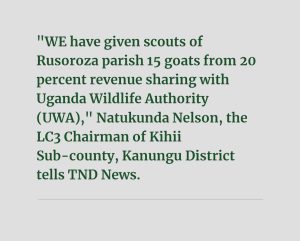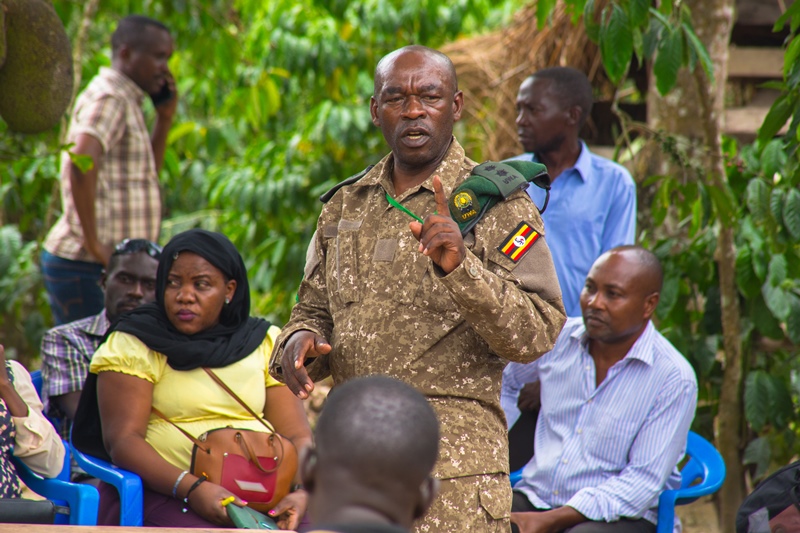Serving their communities voluntarily to reduce human-wildlife conflict, and illegal wildlife trade, among other tasks, community wildlife scouts (CWLSs) in the Queen Elizabeth national game park (protected areas in the southern sector) are up to the tasks.
Queen Elizabeth national park is the second largest in the country after the Murchison Falls national park. The former is popular for elephants, lions, buffaloes, hippopotamus, warthogs; chimpanzees, among others.
The park remains Uganda’s main conservation area – with lions its main tourist attraction. At Queen Elizabeth, there are over 250 large cats found in both southern and northern areas.
Like elsewhere, human-wildlife life conflict, illegal wildlife trade, and poaching by the surrounding communities have been registered at Queen Elizabeth.
Speaking in February at an event organized by InfoNile and partners to ensure media house editors across the country give more space to biodiversity stories, the spokesperson of Uganda Wildlife Authority (UWA) Bashir Hangi says subsistence poachers top their record, adding that they are the majority in jail.
“They poach for their own survival and they don’t go for elephants. These poachers when they upgrade go for trees of value in the parks,” he said at the February event held in Kasese town.
While many poachers have been jailed according to Bashir, “it is never our intention to let people go to jail,” he said, adding that UWA has done a lot of sensitization to the communities.
“We investigate cases ourselves and we have a tribunal to prosecute these cases,” Bashir further revealed in February.
In addition to recruiting and training game rangers to protect animals at different national parks, in Queen Elizabeth’s southern sector consisting of Kanungu and Rukungiri districts, community wildlife scouts have helped UWA to protect animals from ravaging the communities.
Namusoke Janat is UWA’s community conservation ranger for the Ishasha sector, Bukonue camp. “When they (scouts) see wildlife species in the community they report to us,” she said, adding that each of the three sub-counties in Nyanga, Bwambala, and Kihii have got scouts.
Namusoke says the above sub-counties have seven villages, each having five scouts. “They normally work at night guarding elephants and buffaloes.”
In Kanungu district, there are 70 scouts but two got killed by elephants. One was killed last year and another in February 2023, she told TND News in an interview.
The duo was killed because they did not have torches to flash to scare elephants, besides the World Bank donating some, including raincoats, last year.
“They face challenges, they are not facilitated but when they meet rangers, they can get some little support,” she stated.
However, last year, Namusoke said the Kanungu district gave goats to scouts as a reward for their community work. Some scouts, she added, missed out.

Asked why some missed out, Natukunda Nelson did not disclose.
Speaking to Kaguriro Moses who is the chairperson of Queen Elizabeth Wildlife Conservation Scouts and in charge of Nyanga and Kihii sub-counties, they are facing challenges with elephants and buffaloes that attack people’s gardens.
“They come every day, we are struggling with them,” he told TND News.
About other challenges they could be facing, Kaguriro had this to say: “We don’t have any facilitation; we need facilitation to make our work easy.”
Questioned if he and his members are happy being community scouts he, answered: “I’m happy being a scout but if we can get food for our children, it would be good.”
On UWA and if they are in touch, he said the wildlife body gave them gumboots, and “it’s not enough for our members”.
“We have complained but we don’t know what to do,” said the chairperson.
To Kabagambe Humble, the chairperson of Rukungiri District Community Wildlife Scouts Association (RUDCWSA), the association is a community initiative under voluntary work.
“Scouts help in eliminating human-wildlife conflict and we are working at night. We have two mitigation methods: trenches and chain links to stop wild animals from getting to the community,” Kabagambe stated.
According to him, in Rukungiri which is part of the southern sector, they are sensitizing farmers about the ‘problem animals’ they have – including creating awareness about conservation through different programs.
On poaching and other illegal activities, he said they are befriending those doing illegal activities so that they can reform and join the community.
He could not reveal how many have left the wildlife trade through their intervention and tactic, but he cried out.
“No support so far received apart from the training by UWA. No handouts have been given to scouts. We need (rechargeable torches) that do a good job of scaring the elephants.”
According to him, one (1) scout serves 50 farmers. “You find in less than 1km stretch there is a garden.”
There are three parishes in Rukungiri with 82 scouts combined and each of the 16 villages, Kabagambe said, has scouts. In Kikarara parish, there exist Garuka, Nyakatembe A, Nyabugando, Kahimbi, and Kafunjo villages, among others.
In Bwambara parish, Rushaya A and Rushaya B are the villages with scouts. The third parish is Nyabubare with Kakoni, Rutooma, Nyakibingi; Rugyera, and Nyarwimuka villages.
ALSO READ:
- IUCN supports Gulu locals with funds worth shs200m to conserve nature
- Interview: Rehema Kahurananga on IUCN’s strategic agenda on nature, WWD 2023
Also asked if he is proud of doing the unpaid job, he responded, “Yes. Conservation is my work.” “I’m changing the mindset of people that the parks will exist and they have to turn problems into opportunities.”
In 2021, six elephants were killed by poachers in Queen Elizabeth National Park, according to the Uganda Wildlife Authority (UWA). This was described by UWA as ‘a setback’ in efforts to conserve the animals that are facing extinction.
‘Scouts too ambitious’
Twinomugisha Deusdedit, the assistant warden for community conservation at Queen Elizabeth national park responded to some of the issues raised by the scouts’ chairpersons in Kanungu and Rukungiri districts.
“The program of wildlife scouts has just started. When it started, the scouts had a lot of ambitions,” said Twinomugisha, adding that as UWA, they are working with donors and they are optimistic about getting the support to address some of the current challenges.
“You know communities are never satisfied. Currently, we are looking for equipment like gumboots, overall to help them do their work.”
On why UWA is not responding swiftly and yet scouts have become part of them, he answered that “these scouts are not UWA employees, they are for the community, selected by the community and some of them have land to do agriculture besides monitoring wild animals”.

“UWA does not directly employ them but looks for partners who can support them, including training,” Deusdedit added.
Should there be some contract jobs at UWA, he said wildlife scouts will be “our priority”.
He told this digital newspaper that they are planning to have more training to capacitate wildlife scouts, revealing no possible start date or month.

